ESPN Heavily Promoting 'News' Article Criticizing NHL For Warmup Jersey Ban Because It 'Upset The LGBTQ Community'
This past week, the NHL decided to ban all specialty warmup jerseys next season. The decision came largely because of all the problems that Pride Night's caused for teams and the league last year. Obviously, ESPN is not happy about this decision because it allegedly "upsets the LGBTQ community."
Especially unhappy about the decision is ESPN NHL writer Greg Wyshynsky. Wyshynsky heavily criticized Philadelphia Flyers defenseman Ivan Provorov, one of several NHL players who declined to wear a Pride jersey during warmups this season.
Of course, as one of ESPN's main hockey writers, Wyshynsky had to write a story about this decision. And, it's pretty clear from his past comments where Wyshynsky falls on the issue.
However, it seems that ESPN is trying to start shedding its label as a hardcore left-wing sports network. OutKick founder Clay Travis coined the term "MSESPN" years ago because that's how far the network went in pushing left-wing ideology.
They became the MSNBC of sports talk.
Lately, though, I've noticed a slight change in coverage on their website. Look, ESPN is never going to be "down-the-middle" and certainly never going to entertain right-leaning ideas.
Though, it does seem they are trying to be a little less straight left-wing and a little more "left-leaning."
Now, they're not going to police Wyshynsky's personal Twitter page. Or punish Sarah Spain for liking tweets calling her co-worker a "bigot."
But on things they can control -- like their website's home page -- there's quite a bit less opining on these hot-button topics.
That brings us to a Sunday piece from Greg Wyshynsky.
The article is titled "LGBTQIA+ community upset with NHL's warmup jersey ban" and it's been under ESPN.com's "Top Headlines" for over nine hours and counting, as of this writing.
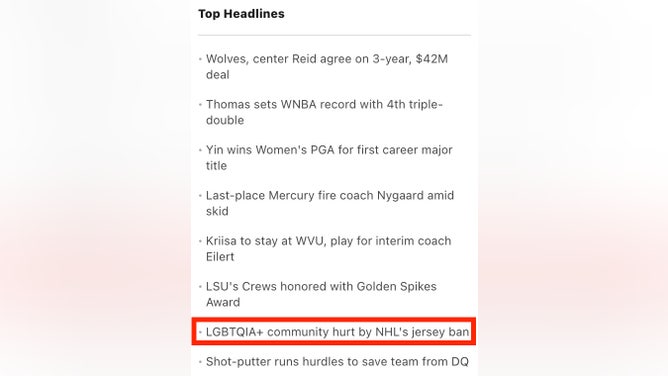
ESPN kept an article about the NHL banning themed warmup jerseys on its homepage for over eight hours because it 'upset the LGBTQ community.' (Screenshot: ESPN.com)
That note, in and of itself, is news. ESPN rarely promotes NHL stories for long. Despite being the league's main broadcast partner, the network frequently disregards the NHL.
But, after the league banned pregame warmup sweaters, ESPN happily kept that particular NHL story on its homepage for longer than a full-time workday.
In the piece, Wyshynsky pretends to "report" the news. And this is the key point. Nowhere in the article does Wyshynsky explicitly deliver his opinion.
In his mind, he's following ESPN's orders to keep his political opinions to himself.
However, he uses a little trick. Instead of reporting the story properly, you know by talking to people on both sides of the issue, he simply quotes people who agree with him.
But because those are the words of other people and not him, he has plausible deniability.
You're not going to fool me, Greg, I know what you're up to.
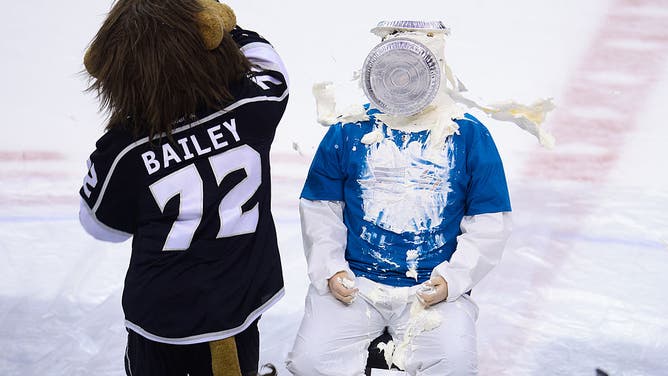
Anyone else wish ESPN "reporter" Greg Wyshynski would take another pie in the face from the LA Kings mascot? (Photo by Noel Vasquez/GC Images)
Let's dive into some of Wyshynsky's tactics, shall we?
The first person he quotes -- after a first paragraph that restates the news -- is a "queer artist." I wonder where that person falls on this issue?
"'In short, it hurts," said Mio Linzie, a queer artist who has collaborated with several NHL teams, including the Vegas Golden Knights and Los Angeles Kings, on Pride jerseys.
"'It doesn't only affect the LGBTQ+ community but it also affects other marginalized communities, as the warmup jerseys is a primary part of community outreach and charity within the NHL. It's also been a space for artists to express themselves and be able to create unique work under the NHL -- and that venue has now partly been taken away.'"
Surely, the next quote comes from someone who agrees with the NHL's decision, right? In the name of balanced reporting?
Well, not quite.
"Adolescent Counseling Services, which supports LGBTQ+ teens and families, helped raise funds through the auction of San Jose Sharks Pride jerseys this season. Dr. Philippe Rey, the executive director of the organization, was disappointed with the NHL's decision.
"'It's unfortunate the NHL has come to this decision, as events like Pride Night, where players wore Pride Night warmup jerseys, are a wonderful opportunity for players to show support to our LGBTQIA+ youth and spread a message of love and inclusivity," Rey said in a statement to ESPN.
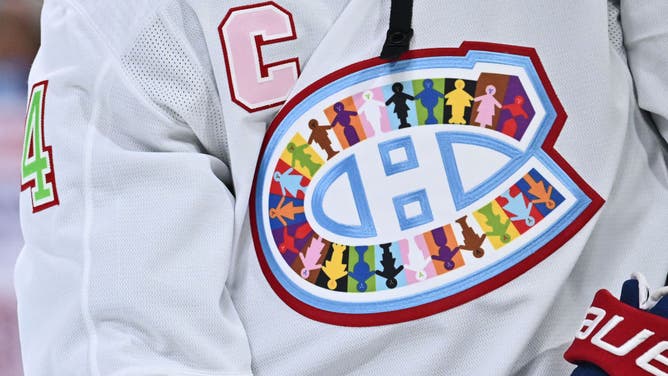
Nick Suzuki of the Montreal Canadiens wearing Pride Night warmup jersey prior to a game. (Photo by Minas Panagiotakis/Getty Images)
"Gestures like this can mean a lot to LGBTQIA+ young people, who experience bullying and hate crimes, are four times more likely to commit suicide, and report feeling unsafe in our world today. Hopefully one day, showing support for other humans won't be seen as a distraction."
Ah, OK. So next up is the executive director of an organization "which supports LGBTQ+ teens and families." Again, I think Wyshynsky probably knew which way this person leaned before asking for comment. Or maybe, he's just "doing his job" by "reporting the news."
Just before this quote, Wyshynsky does sneak in an opinion, but he thinks people aren't smart enough to catch onto it.
Oh, Greg, you're not that smart.
"The NHL announced Thursday that teams will no longer wear specialty jerseys during warmups, after several players were scrutinized for refusing to wear Pride Night sweaters last season," Wyshynsky writes.
Exactly who "scrutinized" players for "refusing to wear Pride Night sweaters," Greg? Well, you did, certainly. As did other people in corporate media.
OutKick certainly did not. Nor did most NHL fans.
Wyshynsky, to his credit, does note that the NHL is not stopping teams from hosting Pride Night. Or any other themed night for that matter. Nor are they stopping teams from producing and selling Pride Night jerseys.
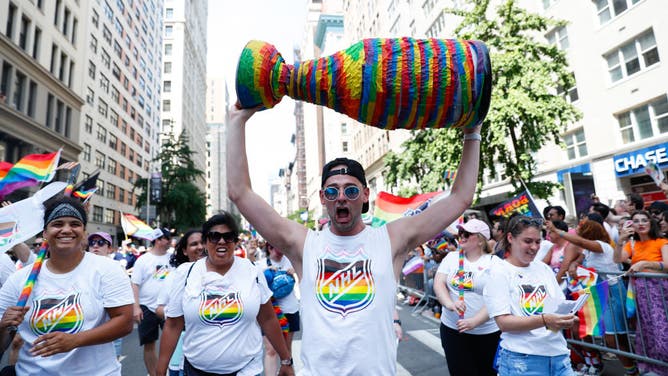
People participate in the NHL March during the NYC Pride Parade for members of the LGBTQ community. (Photo by Jared Silber/NHLI via Getty Images)
The only change made is that the players are not going to wear them for warmups. And, as Wyshynsky notes, it's not just the Pride Night jerseys, either.
"NHL commissioner Gary Bettman has stated that specialty nights will continue to be held and that teams can still create jerseys to be auctioned off.
"The NHL specialty jersey ban includes jerseys that teams have worn for Black History Month, Women's History Month, Military Appreciation Night, Hockey Fights Cancer, as well as more localized celebrations like San Jose's Hispanic Heritage Night."
Here, Wyshynsky does report some news. But, right after, he couldn't help himself but inject another opinion.
"Those player-worn jerseys were often designed by artists from marginalized communities and would be auctioned off after games to benefit local and national charities -- oftentimes generating thousands of dollars per jersey, depending on the player," the article says.
Wyshynsky writes that the jerseys are "often designed by artists from marginalized communities" and generated "thousands of dollars per player."
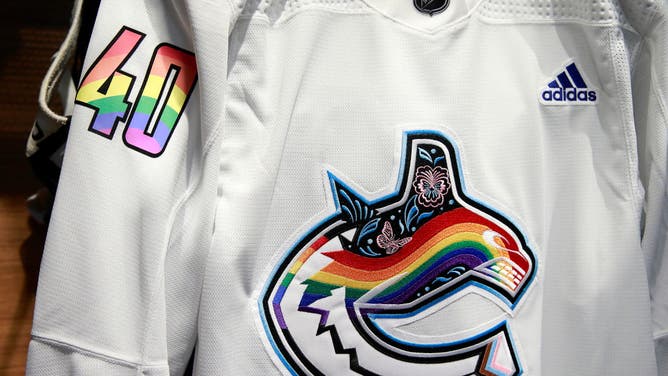
Vancouver Canucks Pride Night warmup jerseys, designed by a member of the LGQTQ community. (Photo by Jeff Vinnick/NHLI via Getty Images)
But, he just "reported" that NHL teams can continue producing these jerseys. They did not ban "queer artists" from designing jerseys or ban teams from auctioning them off for charity. So, what then is the point of adding that second part?
We know the point: Wyshynsky is spinning a narrative disguised as news.
That brings me to my absolute favorite part of the article. In the next section, Wyshynsky accidentally undercuts his entire piece, and I don't think he realizes it. Which is ironic, again, because he fancies himself so smart that no one will notice what he's doing in this "news" piece.
In an attempt to add at least one voice that isn't blasting the NHL for this decision, he includes a statement from the American Cancer Society. Remember, the NHL banned ALL themed warmup jerseys, not just Pride Night.
That means no more "Hockey Fights Cancer" sweaters worn by players prior to games, either.
"The American Cancer Society, which benefited from the sale of player-worn 'Hockey Fights Cancer' jerseys in the past, told ESPN that jersey sales are just one part of the NHL's charitable efforts," the article reads.
"We are proud to partner with the NHL and the NHLPA in the fight against cancer, and thankful that their support has helped thousands of cancer patients and their families through free rides to treatment, free lodging during treatment, and our 24/7 support line," the American Cancer Society said in a statement.
"Hockey Fights Cancer jerseys are one aspect of our broad partnership with the NHL and NHLPA that will continue to advance our efforts to end cancer as we know it, for everyone. We look forward to continuing that work with the league and the players' association for many years to come."
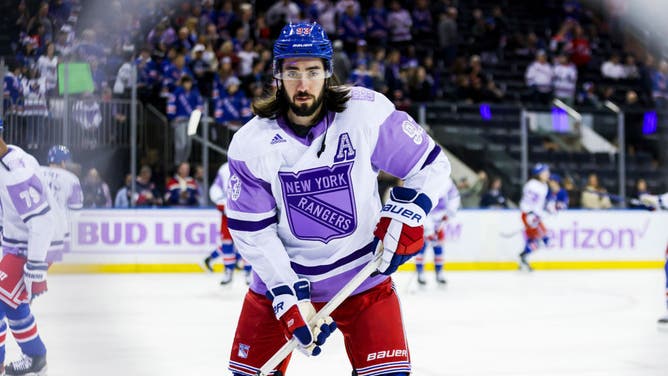
Mika Zibanejad of the New York Rangers skates during warmups in a special 'Hockey Fights Cancer.' (Photo by Jared Silber/NHLI via Getty Images)
Wait a second. Is the American Cancer Society saying it's OK if NHL players don't wear specific warmup jerseys because they support cancer patients in other ways?
Because according to the LGBTQ community, not wearing the cancer sweaters means that the NHL hates cancer patients, doesn't it?
To wit, the next person Wyshynsky quotes is someone who goes by the name "Teepop."
"'The NHL has been doing Pride nights and specialty jerseys highlighting all communities for many years now," Teepop, a Black LGBTQ artist based in Miami who designed the Panthers' Pride jerseys this season, told ESPN.
"Unfortunately, this past year the universal climate for equality has shifted. Axing all of these special jerseys across the board is gut wrenching. Because it says, 'Everyone is not welcome here on the ice.' No matter how they try to say that's not what they are promoting, it is what they are saying."
So, if I'm following this correctly, cancer patients and family are not welcome at hockey games either, right? The NHL also cancelled Military Appreciation warmup sweaters, so I guess the league doesn't want veterans at hockey games?
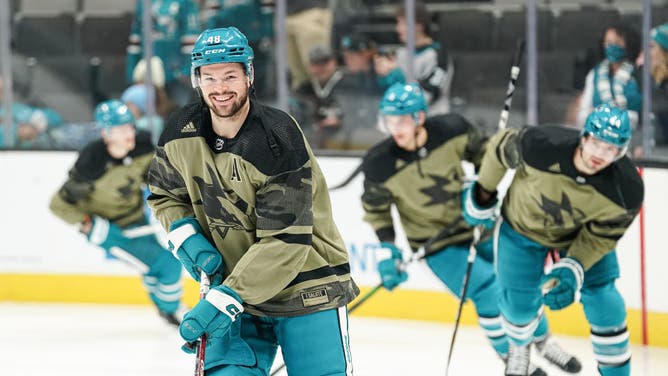
Tomas Hertl of the San Jose Sharks skates during warmups wearing a special Military Appreciation jersey. (Photo by Kavin Mistry/NHLI via Getty Images)
This is the problem with all of this nonsense. Not celebrating a group doesn't mean that you hate the group.
It doesn't even mean you don't support the group existence. It means you don't celebrate it.
I don't celebrate my neighbor's birthday. I fully support her right to exist. She's even welcome in my home. Wild concept, I know.
The article continues to quote several more "gay and queer artists" and even a transgender organist for the Anaheim Ducks.
I won't post the quotes because you can probably guess how they feel about the situation.
This is becoming the new world of "journalism." Last week, The Athletic penned over 2,200 words on the Texas Rangers. Why? Because they're the only MLB team that doesn't host a Pride Night. Thus, they don't properly "support" the LGBTQ community.
In the article, the "reporter" talked to over a dozen Rangers staffers, anonymously. All of them were unhappy about the lack of a Pride Night.
The Athletic couldn't find one, single Rangers employee who agreed with the decision, huh? They probably didn't look very hard.
The Athletic used a very similar tactic to ESPN and Greg Wyshynsky.
"We can pretend we're reporting if we just use other's words to express our opinions," ESPN and The Athletic at some super-secret "journalism" retreat, probably.
I miss when media actually reported the news.
But those days are long gone.